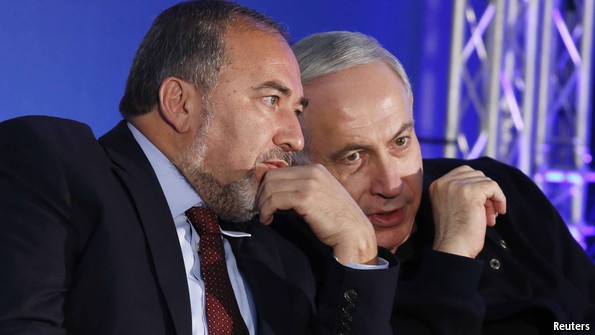Israeli elections are very complex and is characterized by highly unpredictable dynamics. Israeli Prime Minister Benjamin Netanyahu, is the head of Likud, the right wing party that was founded by Menachem in the beginning of 1973. Mr. Netanyahu has been in the office since 2009 and is standing for the second general election. His major opponent is Isaac Herzog, the co-head of center-left Zionist Union coalition. The alliance formation between Israeli Labor party and liberal party Hatnuah, took place in December. The parliamentary system awards the most powerful party with a ruling coalition thereby helping to create a volatile mix of political agendas, ambitions, and personal relationship.
Mr. Herzog, son of Chaim, who was sixth president of Israel, prayed and vowed in Jerusalem to unite the nation after an extremely long period a separation. He is a lawyer by profession and also served in different ministerial positions of middle rank between 2006 and 2011. He has aggressively campaigned against the ruling party by blaming the government of gloomy living standards, government’s foreign policy and negligence of the Palestinian issue. Further, he also highlighted the fact that he has been an army intelligence unit the time the current Israeli Prime Minister Benjamin Netanyahu, a former special force officer, alleged him of being easygoing on security.
Tzipi Livni is the co-leader in the Zionist Union along with Mr Herzog. She come from a prominent political background, her father being the chief figure of Irgun, an ultra-nationalist armed group. She has followed the footsteps of her father and travelled the journey from the wing of Likud to the current position of leading the liberal Hatnua party.
The Prime Minister has strongly appealed to the voters, that if he wins the election and returns back to the office he will never create a Palestinian state. This statement was contradicting Mr. Netanyahu’s earlier promise of two state solution for Israeli-Palestinian conflict in 2009. He has further accused the rival party for colliding with the Arabs in an international conspiracy to overthrow him. All these indicate that Mr. Netanyahu is grappling for his survival in Israel’s politics.
According to the recent polls, Zionist Union launched a tough campaign against its rivals which signals that the results are likely to be very close. However, whatever may be the outcome, both the parties will be needed to negotiate strictly in order to form a big coalition to get control in the Israeli parliament, the Knesset. It has total 120 seats and the winning party will require 61 or more seats in order to form a government.
Eventhough security issue is leading the list of priorities for voters, the economy is still the thought of concern for the political parties. According to a report published in Israel, the real estate prices have surprisingly mounted 55% during the period of 2008-2014.
Israeli election are always characterized by the element of surprise as a substantial portion of public voting remains doubtful even at the end of the campaign. If we take a look on previous elections, Tzipi Livni won 2009 elections but eventually lost to Benjamin Netanyahu, who managed to create a coalition government with majority. However, it is expected that the surprise may once again play the role of game changer in Israeli elections.
Mr. Herzog, son of Chaim, who was sixth president of Israel, prayed and vowed in Jerusalem to unite the nation after an extremely long period a separation. He is a lawyer by profession and also served in different ministerial positions of middle rank between 2006 and 2011. He has aggressively campaigned against the ruling party by blaming the government of gloomy living standards, government’s foreign policy and negligence of the Palestinian issue. Further, he also highlighted the fact that he has been an army intelligence unit the time the current Israeli Prime Minister Benjamin Netanyahu, a former special force officer, alleged him of being easygoing on security.
Tzipi Livni is the co-leader in the Zionist Union along with Mr Herzog. She come from a prominent political background, her father being the chief figure of Irgun, an ultra-nationalist armed group. She has followed the footsteps of her father and travelled the journey from the wing of Likud to the current position of leading the liberal Hatnua party.
The Prime Minister has strongly appealed to the voters, that if he wins the election and returns back to the office he will never create a Palestinian state. This statement was contradicting Mr. Netanyahu’s earlier promise of two state solution for Israeli-Palestinian conflict in 2009. He has further accused the rival party for colliding with the Arabs in an international conspiracy to overthrow him. All these indicate that Mr. Netanyahu is grappling for his survival in Israel’s politics.
According to the recent polls, Zionist Union launched a tough campaign against its rivals which signals that the results are likely to be very close. However, whatever may be the outcome, both the parties will be needed to negotiate strictly in order to form a big coalition to get control in the Israeli parliament, the Knesset. It has total 120 seats and the winning party will require 61 or more seats in order to form a government.
Eventhough security issue is leading the list of priorities for voters, the economy is still the thought of concern for the political parties. According to a report published in Israel, the real estate prices have surprisingly mounted 55% during the period of 2008-2014.
Israeli election are always characterized by the element of surprise as a substantial portion of public voting remains doubtful even at the end of the campaign. If we take a look on previous elections, Tzipi Livni won 2009 elections but eventually lost to Benjamin Netanyahu, who managed to create a coalition government with majority. However, it is expected that the surprise may once again play the role of game changer in Israeli elections.





